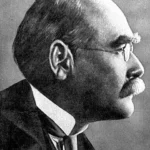 | |
The Devil And The Deep Sea | |
| Author | Rudyard Kipling |
|---|---|
| Published |
1896
|
| Language | English |
| Nationality | British |
| Genre | Adventure, Children's Literature |
1896 Short Story
The Devil And The Deep Sea
The Devil And The Deep Sea is an English Adventure, Children's Literature short story by British writer Rudyard Kipling. It was first published in 1896.
The Devil And The Deep Sea
by Rudyard Kipling
All supplies very bad and dear, and there are no facilities for even the smallest repairs. – Sailing Directions.
Her nationality was British, but you will not find her house-flag in the list of our mercantile marine. She was a nine-hundred-ton, iron, schooner-rigged, screw cargo-boat, differing externally in no way from any other tramp of the sea. But it is with steamers as it is with men. There are those who will for a consideration sail extremely close to the wind; and, in the present state of a fallen world, such people and such steamers have their use. From the hour that the Aglaia first entered the Clyde – new, shiny, and innocent, with a quart of cheap champagne trickling down her cut-water – Fate and her owner, who was also her captain, decreed that she should deal with embarrassed crowned heads, fleeing Presidents, financiers of over-extended ability, women to whom change of air was imperative, and the lesser law-breaking Powers. Her career led her sometimes into the Admiralty Courts, where the sworn statements of her skipper filled his brethren with envy. The mariner cannot tell or act a lie in the face of the sea, or mis-lead a tempest; but, as lawyers have discovered, he makes up for chances withheld when he returns to shore, an affidavit in either hand.
The Aglaia figured with distinction in the great Mackinaw salvage-case. It was her first slip from virtue, and she learned how to change her name, but not her heart, and to run across the sea. As the Guiding Light she was very badly wanted in a South American port for the little matter of entering harbour at full speed, colliding with a coal-hulk and the State’s only man-of-war, just as that man-of-war was going to coal. She put to sea without explanations, though three forts fired at her for half an hour. As the Julia M’Gregor she had been concerned in picking up from a raft certain gentlemen who should have stayed in Noumea, but who preferred making themselves vastly unpleasant to authority in quite another quarter of the world; and as the Shah-in-Shah she had been overtaken on the high seas, indecently full of munitions of war, by the cruiser of an agitated Power at issue with its neighbour. That time she was very nearly sunk, and her riddled hull gave eminent lawyers of two countries great profit. After a season she reappeared as the Martin Hunt painted a dull slate-colour, with pure saffron funnel, and boats of robin’s-egg blue, engaging in the Odessa trade till she was invited (and the invitation could not well be disregarded) to keep away from Black Sea ports altogether.
She had ridden through many waves of depression. Freights might drop out of sight, Seamen’s Unions throw spanners and nuts at certificated masters, or stevedores combine till cargo perished on the dock-head; but the boat of many names came and went, busy, alert, and inconspicuous always. Her skipper made no complaint of hard times, and port officers observed that her crew signed and signed again with the regularity of Atlantic liner boatswains. Her name she changed as occasion called; her well-paid crew never; and a large percentage of the profits of her voyages was spent with an open hand on her engine-room. She never troubled the underwriters, and very seldom stopped to talk with a signal-station, for her business was urgent and private.
But an end came to her tradings, and she perished in this manner. Deep peace brooded over Europe, Asia, Africa, America, Australasia, and Polynesia. The Powers dealt together more or less honestly; banks paid their depositors to the hour; diamonds of price came safely to the hands of their owners; Republics rested content with their Dictators; diplomats found no one whose presence in the least incommoded them; monarchs lived openly with their lawfully wedded wives. It was as though the whole earth had put on its best Sunday bib and tucker; and business was very bad for the Martin Hunt. The great, virtuous calm engulfed her, slate sides, yellow funnel, and all, but cast up in another hemisphere the steam whaler Haliotis, black and rusty, with a manure-coloured funnel, a litter of dingy white boats, and an enormous stove, or furnace, for boiling blubber on her forward well-deck. There could be no doubt that her trip was successful, for she lay at several ports not too well known, and the smoke of her trying-out insulted the beaches.
Anon she departed, at the speed of the average London four-wheeler, and entered a semi-inland sea, warm, still, and blue, which is, perhaps, the most strictly preserved water in the world. There she stayed for a certain time, and the great stars of those mild skies beheld her playing puss-in-the-corner among islands where whales are never found. All that while she smelt abominably, and the smell, though fishy, was not whalesome. One evening calamity descended upon her from the island of Pygang-Watai, and she fled, while her crew jeered at a fat black-and-brown gunboat puffing far behind. They knew to the last revolution the capacity of every boat, on those seas, that they were anxious to avoid. A British ship with a good conscience does not, as a rule, flee from the man-of-war of a foreign Power, and it is also considered a breach of etiquette to stop and search British ships at sea. These things the skipper of the Haliotis did not pause to prove, but held on at an inspiriting eleven knots an hour till nightfall. One thing only he overlooked.
The Power that kept an expensive steam-patrol moving up and down those waters (they had dodged the two regular ships of the station with an ease that bred contempt) had newly brought up a third and a fourteen-knot boat with a clean bottom to help the work; and that was why the Haliotis, driving hard from the east to the west, found herself at daylight in such a position that she could not help seeing an arrangement of four flags, a mile and a half behind, which read: “Heave to, or take the consequences!”
She had her choice, and she took it. The end came when, presuming on her lighter draught, she tried to draw away northward over a friendly shoal. The shell that arrived by way of the Chief Engineer’s cabin was some five inches in diameter, with a practice, not a bursting, charge. It had been intended to cross her bows, and that was why it knocked the framed portrait of the Chief Engineer’s wife – and she was a very pretty girl – on to the floor, splintered his wash-hand stand, crossed the alleyway into the engine-room, and striking on a grating, dropped directly in front of the forward engine, where it burst, neatly fracturing both the bolts that held the connecting-rod to the forward crank.
What follows is worth consideration. The forward engine had no more work to do. Its released piston-rod, therefore, drove up fiercely, with nothing to check it, and started most of the nuts of the cylinder-cover. It came down again, the full weight of the steam behind it, and the foot of the disconnected connecting-rod, useless as the leg of a man with a sprained ankle, flung out to the right and struck the starboard, or right-hand, cast-iron supporting-column of the forward engine, cracking it clean through about six inches above the base, and wedging the upper portion outwards three inches towards the ship’s side. There the connecting-rod jammed. Meantime, the after-engine, being as yet unembarrassed, went on with its work, and in so doing brought round at its next revolution the crank of the forward engine, which smote the already jammed connecting-rod, bending it and therewith the piston-rod cross-head – the big cross-piece that slides up and down so smoothly.
The cross-head jammed sideways in the guides, and, in addition to putting further pressure on the already broken starboard supporting-column, cracked the port, or left-hand, supporting-column in two or three places. There being nothing more that could be made to move, the engines brought up, all standing, with a hiccup that seemed to lift the Haliotis a foot out of the water; and the engine-room staff, opening every steam outlet that they could find in the confusion, arrived on deck somewhat scalded, but calm. There was a sound below of things happening – a rushing, clicking, purring, grunting, rattling noise that did not last for more than a minute. It was the machinery adjusting itself, on the spur of the moment, to a hundred altered conditions. Mr. Wardrop, one foot on the upper grating, inclined his ear sideways, and groaned. You cannot stop engines working at twelve knots an hour in three seconds without disorganising them. The Haliotis slid forward in a cloud of steam, shrieking like a wounded horse. There was nothing more to do. The five-inch shell with a reduced charge had settled the situation. And when you are full, all three holds, of strictly preserved pearls; when you have cleaned out the Tanna Bank, the Sea-Horse Bank, and four other banks from one end to the other of the Amanala Sea – when you have ripped out the very heart of a rich Government monopoly so that five years will not repair your wrong-doings – you must smile and take what is in store. But the skipper reflected, as a launch put out from the man-of-war, that he had been bombarded on the high seas, with the British flag – several of them – picturesquely disposed above him, and tried to find comfort from the thought.
Where,” said the stolid naval lieutenant hoisting himself aboard, “where are those dam’ pearls?”
They were there beyond evasion. No affidavit could do away with the fearful smell of decayed oysters, the diving-dresses, and the shell-littered hatches. They were there to the value of seventy thousand pounds, more or less; and every pound poached.
The man-of-war was annoyed; for she had used up many tons of coal, she had strained her tubes, and, worse than all, her officers and crew had been hurried. Every one on the Haliotis was arrested and rearrested several times, as each officer came aboard; then they were told by what they esteemed to be the equivalent of a midshipman that they were to consider themselves prisoners, and finally were put under arrest.
It’s not the least good,” said the skipper, suavely. “You’d much better send us a tow – ”
“Be still – you are arrest!” was the reply.
“Where the devil do you expect we are going to escape to?” We’re helpless. You’ve got to tow us into somewhere, and explain why you fired on us. Mr. Wardrop, we’re helpless, aren’t we?”
“Ruined from end to end,” said the man of machinery. “If she rolls, the forward cylinder will come down and go through her bottom. Both columns are clean cut through. There’s nothing to hold anything up.”
The council of war clanked off to see if Mr. Wardrop’s words were true. He warned them that it was as much as a man’s life was worth to enter the engine-room, and they contented themselves with a distant inspection through the thinning steam. The Haliotis lifted to the long, easy swell, and the starboard supporting-column ground a trifle, as a man grits his teeth under the knife. The forward cylinder was depending on that unknown force men call the pertinacity of materials, which now and then balances that other heartbreaking power, the perversity of inanimate things.
“You see!” said Mr. Wardrop, hurrying them away. “The engines aren’t worth their price as old iron.”
“We tow,” was the answer. “Afterwards we shall confiscate.”
The man-of-war was short-handed, and did not see the necessity for putting a prize-crew aboard the Haliotis. So she sent one sublieutenant, whom the skipper kept very drunk, for he did not wish to make the tow too easy, and, moreover, he had an inconspicuous little rope hanging from the stem of his ship.
Then they began to tow at an average speed of four knots an hour. The Haliotis was very hard to move, and the gunnery-lieutenant, who had fired the five-inch shell, had leisure to think upon consequences. Mr. Wardrop was the busy man. He borrowed all the crew to shore up the cylinders with spars and blocks from the bottom and sides of the ship. It was a day’s risky work; but anything was better than drowning at the end of a tow-rope; and if the forward cylinder had fallen, it would have made its way to the sea-bed, and taken the Haliotis after.
“Where are we going to, and how long will they tow us?” he asked of the skipper.
“God knows! and this prize-lieutenant’s drunk. What do you think you can do?”
“There’s just the bare chance,” Mr. Wardrop whispered, though no one was within hearing -“there’s just the bare chance o’ repairin’ her, if a man knew how. They’ve twisted the very guts out of her, bringing her up with that jerk; but I’m saying that, with time and patience, there’s just the chance o’ making steam yet. We could do it.”
The skipper’s eye brightened. “Do you mean,” he began, “that she is any good?”
“Oh, no,” said Mr. Wardrop. “She’ll need three thousand pounds in repairs, at the lowest, if she’s to take the sea again, an’ that apart from any injury to her structure. She’s like a man fallen down five pair o’ stairs. We can’t tell for months what has happened; but we know she’ll never be good again without a new inside. Ye should see the condenser-tubes an’ the steam connections to the donkey, for two things only. I’m not afraid of them repairin’ her. I’m afraid of them stealin’ things.”
“They’ve fired on us. They’ll have to explain that.”
“Our reputation’s not good enough to ask for explanations. Let’s take what we have and be thankful. Ye would not have consuls remembern’ the Guidin’ Light, an’ the Shah-in-Shah, an’ the Aglaia, at this most alarmin’ crisis. We’ve been no better than pirates these ten years. Under Providence we’re no worse than thieves now. We’ve much to be thankful for – if we e’er get back to her.”
“Make it your own way, then,” said the skipper. “If there’s the least chance – ”
“I’ll leave none,” said Mr. Wardrop – “none that they’ll dare to take. Keep her heavy on the tow, for we need time.”
The skipper never interfered with the affairs of the engine-room, and Mr. Wardrop – an artist in his profession – turned to and composed a work terrible and forbidding. His background was the dark-grained sides of the engine-room; his material the metals of power and strength, helped out with spars, baulks, and ropes. The man-of-war towed sullenly and viciously. The Haliotis behind her hummed like a hive before swarming. With extra and totally unneeded spars her crew blocked up the space round the forward engine till it resembled a statue in its scaffolding, and the butts of the shores interfered with every view that a dispassionate eye might wish to take. And that the dispassionate mind might be swiftly shaken out of its calm, the well-sunk bolts of the shores were wrapped round untidily with loose ends of ropes, giving a studied effect of most dangerous insecurity. Next, Mr. Wardrop took up a collection from the after-engine, which, as you will remember, had not been affected in the general wreck. The cylinder escape-valve he abolished with a flogging-hammer. It is difficult in far-off ports to come by such valves, unless, like Mr. Wardrop, you keep duplicates in store. At the same time men took off the nuts of two of the great holding-down bolts that serve to keep the engines in place on their solid bed. An engine violently arrested in mid-career may easily jerk off the nut of a holding-down bolt, and this accident looked very natural.
Passing along the tunnel, he removed several shaft coupling-bolts and -nuts, scattering other and ancient pieces of iron underfoot. Cylinder-bolts he cut off to the number of six from the after-engine cylinder, so that it might match its neighbour, and stuffed the bilge – and feed-pumps with cotton-waste. Then he made up a neat bundle of the various odds and ends that he had gathered from the engines – little things like nuts and valve-spindles, all carefully tallowed – and retired with them under the floor of the engine-room, where he sighed, being fat, as he passed from manhole to manhole of the double bottom, and in a fairly dry submarine compartment hid them. Any engineer, particularly in an unfriendly port, has a right to keep his spare stores where he chooses; and the foot of one of the cylinder shores blocked all entrance into the regular store-room, even if that had not been already closed with steel wedges. In conclusion, he disconnected the after-engine, laid piston and connecting-rod, carefully tallowed, where it would be most inconvenient to the casual visitor, took out three of the eight collars of the thrust-block, hid them where only he could find them again, filled the boilers by hand, wedged the sliding doors of the coal-bunkers, and rested from his labours. The engine-room was a cemetery, and it did not need the contents of the ash-lift through the skylight to make it any worse.
He invited the skipper to look at the completed work.
Saw ye ever such a forsaken wreck as that?” said he, proudly. “It almost frights me to go under those shores. Now, what d’ you think they’ll do to us?”
“Wait till we see,” said the skipper. “It’ll be bad enough when it comes.”
He was not wrong. The pleasant days of towing ended all too soon, though the Haliotis trailed behind her a heavily weighted jib stayed out into the shape of a pocket; and Mr. Wardrop was no longer an artist of imagination, but one of seven-and-twenty prisoners in a prison full of insects. The man-of-war had towed them to the nearest port, not to the headquarters of the colony, and when Mr. Wardrop saw the dismal little harbour, with its ragged line of Chinese junks, its one crazy tug, and the boat-building shed that, under the charge of a philosophical Malay, represented a dockyard, he sighed and shook his head.
“I did well,” he said. “This is the habitation o’ wreckers an’ thieves. We’re at the uttermost ends of the earth. Think you they’ll ever know in England?”
“Doesn’t look like it,” said the skipper.
They were marched ashore with what they stood up in, under a generous escort, and were judged according to the customs of the country, which, though excellent, are a little out of date. There were the pearls; there were the poachers; and there sat a small but hot Governor. He consulted for a while, and then things began to move with speed, for he did not wish to keep a hungry crew at large on the beach, and the man-of-war had gone up the coast. With a wave of his hand – a stroke of the pen was not necessary – he consigned them to the black gang-tana, the back-country, and the hand of the Law removed them from his sight and the knowledge of men. They were marched into the palms, and the back-country swallowed them up – all the crew of the Haliotis.
Deep peace continued to brood over Europe, Asia, Africa, America, Australasia, and Polynesia.
* * * * * * * * * * * *
It was the firing that did it. They should have kept their counsel; but when a few thousand foreigners are bursting with joy over the fact that a ship under the British flag has been fired at on the high seas, news travels quickly; and when it came out that the pearl-stealing crew had not been allowed access to their consul (there was no consul within a few hundred miles of that lonely port) even the friendliest of Powers has a right to ask questions. The great heart of the British public was beating furiously on account of the performance of a notorious race-horse, and had not a throb to waste on distant accidents; but somewhere deep in the hull of the ship of State there is machinery which more or less accurately takes charge of foreign affairs. That machinery began to revolve, and who so shocked and surprised as the Power that had captured the Haliotis? It explained that colonial governors and far-away men-of-war were difficult to control, and promised that it would most certainly make an example both of the Governor and the vessel. As for the crew reported to be pressed into military service in tropical climes, it would produce them as soon as possible, and it would apologise, if necessary. Now, no apologies were needed. When one nation apologises to another, millions of amateurs who have no earthly concern with the difficulty hurl themselves into the strife and embarrass the trained specialist. It was requested that the crew be found, if they were still alive – they had been eight months beyond knowledge – and it was promised that all would be forgotten.
The little Governor of the little port was pleased with himself. Seven-and-twenty white men made a very compact force to throw away on a war that had neither beginning nor end – a jungle and stockade fight that flickered and smouldered through the wet hot years in the hills a hundred miles away, and was the heritage of every wearied official. He had, he thought, deserved well of his country; and if only some one would buy the unhappy Haliotis, moored in the harbour below his verandah, his cup would be full. He looked at the neatly silvered lamps that he had taken from her cabins, and thought of much that might be turned to account. But his countrymen in that moist climate had no spirit. They would peep into the silent engine-room, and shake their heads. Even the men-of-war would not tow her further up the coast, where the Governor believed that she could be repaired. She was a bad bargain; but her cabin carpets were undeniably beautiful, and his wife approved of her mirrors.
Three hours later cables were bursting round him like shells, for, though he knew it not, he was being offered as a sacrifice by the nether to the upper millstone, and his superiors had no regard for his feelings. He had, said the cables, grossly exceeded his power, and failed to report on events. He would, therefore – at this he cast himself back in his hammock – produce the crew of the Haliotis. He would send for them, and, if that failed, he would put his dignity on a pony and fetch them himself. He had no conceivable right to make pearl-poachers serve in any war. He would be held responsible.
Next morning the cables wished to know whether he had found the crew of the Haliotis. They were to be found, freed and fed – he was to feed them – till such time as they could be sent to the nearest English port in a man-of-war. If you abuse a man long enough in great words flashed over the sea-beds, things happen. The Governor sent inland swiftly for his prisoners, who were also soldiers; and never was a militia regiment more anxious to reduce its strength. No power short of death could make these mad men wear the uniform of their service. They would not fight, except with their fellows, and it was for that reason the regiment had not gone to war, but stayed in a stockade, reasoning with the new troops. The autumn campaign had been a fiasco, but here were the Englishmen. All the regiment marched back to guard them, and the hairy enemy, armed with blow-pipes, rejoiced in the forest. Five of the crew had died, but there lined up on the Governor’s verandah two-and-twenty men marked about the legs with the scars of leech-bites. A few of them wore fringes that had once been trousers; the others used loin-cloths of gay patterns; and they existed beautifully but simply in the Governor’s verandah, and when he came out they sang at him. When you have lost seventy thousand pounds’ worth of pearls, your pay, your ship, and all your clothes, and have lived in bondage for five months beyond the faintest pretences of civilisation, you know what true independence means, for you become the happiest of created things – natural man.
The Governor told the crew that they were evil, and they asked for food. When he saw how they ate, and when he remembered that none of the pearl patrol-boats were expected for two months, he sighed. But the crew of the Haliotis lay down in the verandah, and said that they were pensioners of the Governor’s bounty. A grey-bearded man, fat and bald-headed, his one garment a green-and-yellow loin-cloth, saw the Haliotis in the harbour, and bellowed for joy. The men crowded to the verandah-rail, kicking aside the long cane chairs. They pointed, gesticulated, and argued freely, without shame. The militia regiment sat down in the Governor’s garden. The Governor retired to his hammock – it was as easy to be killed lying as standing – and his women squeaked from the shuttered rooms.
“She sold?” said the grey-bearded man, pointing to the Haliotis. He was Mr. Wardrop.
“No good,” said the Governor, shaking his head. “No one come buy.”
“He’s taken my lamps, though,” said the skipper. He wore one leg of a pair of trousers, and his eye wandered along the verandah. The Governor quailed. There were cuddy camp-stools and the skipper’s writing-table in plain sight.
“They’ve cleaned her out, o’ course,” said Mr. Wardrop. “They would. We’ll go aboard and take an inventory. See!” He waved his hands over the harbour. “We – live – there – now. Sorry?”
The Governor smiled a smile of relief.
“He’s glad of that,” said one of the crew, reflectively. “I shouldn’t wonder.”
They flocked down to the harbour-front, the militia regiment clattering behind, and embarked themselves in what they found – it happened to be the Governor’s boat. Then they disappeared over the bulwarks of the Haliotis, and the Governor prayed that they might find occupation inside.
Mr. Wardrop’s first bound took him to the engine-room; and when the others were patting the well-remembered decks, they heard him giving God thanks that things were as he had left them. The wrecked engines stood over his head untouched; no inexpert hand had meddled with his shores; the steel wedges of the store-room were rusted home; and, best of all, the hundred and sixty tons of good Australian coal in the bunkers had not diminished.
“I don’t understand it,” said Mr. Wardrop. “Any Malay knows the use o’ copper. They ought to have cut away the pipes. And with Chinese junks coming here, too. It’s a special interposition o’ Providence.”
“You think so,” said the skipper, from above. “There’s only been one thief here, and he’s cleaned her out of all my things, anyhow.”
Here the skipper spoke less than the truth, for under the planking of his cabin, only to be reached by a chisel, lay a little money which never drew any interest – his sheet-anchor to windward. It was all in clean sovereigns that pass current the world over, and might have amounted to more than a hundred pounds.
“He’s left me alone. Let’s thank God,” repeated Mr. Wardrop.
“He’s taken everything else; look!”
The Haliotis, except as to her engine-room, had been systematically and scientifically gutted from one end to the other, and there was strong evidence that an unclean guard had camped in the skipper’s cabin to regulate that plunder. She lacked glass, plate, crockery, cutlery, mattresses, cuddy carpets and chairs, all boats, and her copper ventilators. These things had been removed, with her sails and as much of the wire rigging as would not imperil the safety of the masts.
“He must have sold those,” said the skipper. “The other things are in his house, I suppose.”
Every fitting that could be pried or screwed out was gone. Port, starboard, and masthead lights; teak gratings; sliding sashes of the deckhouse; the captain’s chest of drawers, with charts and chart-table; photographs, brackets, and looking-glasses; cabin doors; rubber cuddy mats; hatch-irons; half the funnel-stays; cork fenders; carpenter’s grindstone and tool-chest; holystones, swabs, squeegees; all cabin and pantry lamps; galley-fittings en bloc; flags and flag-locker; clocks, chronometers; the forward compass and the ship’s bell and belfry, were among the missing.
There were great scarred marks on the deck-planking over which the cargo-derricks had been hauled. One must have fallen by the way, for the bulwark-rails were smashed and bent and the side-plates bruised.
“It’s the Governor,” said the skipper “He’s been selling her on the instalment plan.”
“Let’s go up with spanners and shovels, and kill ’em all,” shouted the crew. “Let’s drown him, and keep the woman!”
“Then we’ll be shot by that black-and-tan regiment – our regiment. What’s the trouble ashore? They’ve camped our regiment on the beach.”
“We’re cut off; that’s all. Go and see what they want,” said Mr. Wardrop. “You’ve the trousers.”
In his simple way the Governor was a strategist. He did not desire that the crew of the Haliotis should come ashore again, either singly or in detachments, and he proposed to turn their steamer into a convict-hulk. They would wait – he explained this from the quay to the skipper in the barge – and they would continue to wait till the man-of-war came along, exactly where they were. If one of them set foot ashore, the entire regiment would open fire, and he would not scruple to use the two cannon of the town. Meantime food would be sent daily in a boat under an armed escort. The skipper, bare to the waist, and rowing, could only grind his teeth; and the Governor improved the occasion, and revenged himself for the bitter words in the cables, by saying what he thought of the morals and manners of the crew. The barge returned to the Haliotis in silence, and the skipper climbed aboard, white on the cheek-bones and blue about the nostrils.
“I knew it,” said Mr. Wardrop; “and they won’t give us good food, either. We shall have bananas morning, noon, and night, an’ a man can’t work on fruit. We know that.”
Then the skipper cursed Mr. Wardrop for importing frivolous side-issues into the conversation; and the crew cursed one another, and the Haliotis, the voyage, and all that they knew or could bring to mind. They sat down in silence on the empty decks, and their eyes burned in their heads. The green harbour water chuckled at them overside. They looked at the palm-fringed hills inland, at the white houses above the harbour road, at the single tier of native craft by the quay, at the stolid soldiery sitting round the two cannon, and, last of all, at the blue bar of the horizon. Mr. Wardrop was buried in thought, and scratched imaginary lines with his untrimmed finger-nails on the planking.
“I make no promise,” he said, at last, “for I can’t say what may or may not have happened to them. But here’s the ship, and here’s us.”
There was a little scornful laughter at this, and Mr. Wardrop knitted his brows. He recalled that in the days when be wore trousers he had been Chief Engineer of the Haliotis.
“Harland, Mackesy, Noble, Hay, Naughton, Fink, O’Hara, Trumbull.”
“Here, sir!” The instinct of obedience waked to answer the roll-call of the engine-room.
“Below!”
They rose and went.
“Captain, I’ll trouble you for the rest of the men as I want them. We’ll get my stores out, and clear away the shores we don’t need, and then we’ll patch her up. My men will remember that they’re in the Haliotis, – under me.”
He went into the engine-room, and the others stared. They were used to the accidents of the sea, but this was beyond their experience. None who had seen the engine-room believed that anything short of new engines from end to end could stir the Haliotis from her moorings.
The engine-room stores were unearthed, and Mr. Wardrop’s face, red with the filth of the bilges and the exertion of travelling on his stomach, lit with joy. The spare gear of the Haliotis had been unusually complete, and two-and-twenty men, armed with screw-jacks, differential blocks, tackle, vices, and a forge or so, can look Kismet between the eyes without winking. The crew were ordered to replace the holding-down and shaft-bearing bolts, and return the collars of the thrust-block. When they had finished, Mr. Wardrop delivered a lecture on repairing compound engines without the aid of the shops, and the men sat about on the cold machinery. The cross-head jammed in the guides leered at them drunkenly, but offered no help. They ran their fingers hopelessly into the cracks of the starboard supporting-column, and picked at the ends of the ropes round the shores, while Mr. Wardrop’s voice rose and fell echoing, till the quick tropic night closed down over the engine-room skylight.
Next morning the work of reconstruction began. It has been explained that the foot of the connecting-rod was forced against the foot of the starboard supporti







